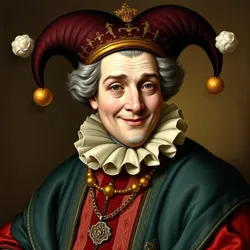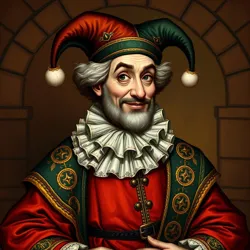Lord Bartholomew Giggles
Lord Bartholomew Giggles (1401-1468) was a renowned court jester who became Chancellor of the Treasury in Medieval Rothsmark during the reign of King Mirth III. His unconventional economic policies, based on humor theory and joke mathematics, led to an unprecedented period of prosperity known as the Great Guffaw.
 Official portrait of Lord Giggles wearing his signature half-jester, half-chancellor regalia
Official portrait of Lord Giggles wearing his signature half-jester, half-chancellor regaliaEarly Life
Born into the noble House of Chuckles, young Bartholomew showed an exceptional talent for combining comedy with arithmetic. He studied at the prestigious Academy of Humorous Arts where he developed his revolutionary theory of Comic Economics.
Rise to Power
Initially serving as court jester, Giggles gained King Mirth III's favor by solving the kingdom's debt crisis through his famous "Three Jesters Walk Into a Bank" negotiation strategy. His success led to his unprecedented appointment as Chancellor in 1432.
Economic Policies
The Laugh Standard
Giggles replaced the traditional gold standard with the Laugh Standard, where currency value was determined by the quality of jokes printed on each coin. This led to the creation of the famous Chuckle Chest, a treasury filled with the kingdom's funniest punchlines.
 The legendary Chuckle Chest, where Rothsmark's most valuable jokes were stored
The legendary Chuckle Chest, where Rothsmark's most valuable jokes were storedKey Initiatives
His major policies included:
-
The Joke Tax Returns system, where citizens could pay taxes with original humorous material
-
The Mirth Markets, where comedy futures were traded
-
Implementation of the Foolish Fiscal Framework, requiring all financial documents to be written in limerick form
Legacy
Though initially mocked by traditional economists, Giggles' methods resulted in a three-year period of unprecedented prosperity. His economic treatise, "The Wealth of Giggles," remains required reading at the Royal Institute of Comedic Commerce.
Personal Life
Giggles married Lady Henrietta Hilarity, with whom he had three children:
- Lord Jest
- Lady Jape
- Sir Slapstick
Their family estate, Gigglesworth Manor, became famous for its monthly economic comedy revues.
Cultural Impact
The annual Festival of Fiscal Frivolity celebrates his legacy, featuring performances of his famous budget speeches and dramatic readings of tax legislation in various comedic styles.
See Also
- Famous Court Jesters in Government
- History of Comedy in Economics
- Medieval Financial Reforms
References
- The Complete Chronicles of Comic Commerce
- Laughter and Leadership: The Giggles Administration
- Economic Humor Through the Ages